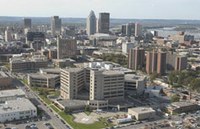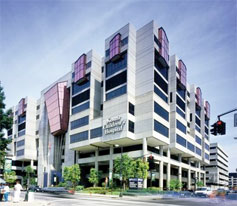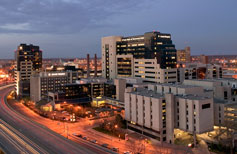Integrated Hospitals
 Resident Education should be broad-based and varied. It should contain not only varied operative experience, but also diverse exposure to types of patients from differing income and social strata, educational backgrounds, and ethnic groups. To obtain this diverse experience, our program has fully integrated all of the major hospitals that comprise the medical center campus an area of several square blocks of sophisticated hospitals as well as the Veterans Administration Medical Center, located two miles away.
Resident Education should be broad-based and varied. It should contain not only varied operative experience, but also diverse exposure to types of patients from differing income and social strata, educational backgrounds, and ethnic groups. To obtain this diverse experience, our program has fully integrated all of the major hospitals that comprise the medical center campus an area of several square blocks of sophisticated hospitals as well as the Veterans Administration Medical Center, located two miles away.
Thus, our full-time faculty and resident staff have full access to more than 1,500 hospital beds and 150 operating rooms. The surgical trainee is exposed to a variety of diagnostic preferences, technical variations, and overall clinical diversity because the attending staff members come from diverse schools of surgery. In the age of managed care, when large groups of patients may shift quickly from one provider to another as a result of provider contract negotiations, this arrangement ensures a steady patient population and provides tremendous flexibility of training.
Surgical residents are expected to participate in pre- and post-operative care on all rotations and be responsible for completion of appropriate paperwork including history and physicals, daily notes, operative notes, and discharge summaries. It is expected that the attending surgeon will be consulted as consistent with both his moral and legal responsibility to the patient. Should your performance be particularly conscientious, you may reasonably expect to do part or all of some operations, under direct supervision, when the attending surgeon has had the opportunity to come to know your abilities.
The volume and diversity of this surgical experience should be such that it will greatly increase the facility with which you learn surgery including a greater depth of understanding of this challenging field. The assignment of full-time faculty to each institution has enhanced the value of the experience, with particular reference to continuity, conferences, and overall surgical education.
This 421-bed hospital serves as the main teaching hospital for the University of Louisville School of Medicine and is the primary Trauma Center for greater Louisville. Of the 421 beds, 150 are assigned to the Surgery Department. Approximately 12, 000 patients are admitted to the hospital annually, and more than 57,000 patients are treated in its Emergency Room. University Hospital is the keystone of our regions only Level 1 Trauma Center. A variety of surgical cases are treated at University Hospital, including trauma emergency surgery, surgical oncology, and endoscopy. Three separate surgical services including two emergency general surgery, trauma, and burn services, and an elective general surgical service are staffed by a full complement of residents and each directed by a chief resident. There are eight clinics per Week in the Ambulatory Care Building adjoining the hospital, providing residents with the necessary exposure to pre-hospital management planning, post-hospital follow-up, and continuity of care.
More than 500 of the area's physicians are on the medical staff. Kelly M. McMasters, M.D., Ph.D., Professor and Chair, is Chief of Surgery and Dr. Glen Franklin is director of surgical education. Dr. Susan Galandiuk has a busy private practice in colorectal surgery there, as well. Private patients of other faculty are regularly hospitalized here.
The hospital is part of a four-building complex that also includes the Healthcare Outpatient Center, which houses University of Louisville Physicians, James Graham Brown Cancer Center, and Institutional Services Center.
The Robley Rex Veterans Affairs Medical Center is 444-bed complex is located about 3.5 miles from the downtown medical center. The VA Medical Center offers a rich patient experience in complex general surgery, surgical oncology, and vascular surgery. The spectrum of disease seen is typical of any VA and includes vascular disease, cancer, hernias, complex intra-abdominal cases, and complicated wounds. There is a busy endoscopic service at the Robley Rex Veterans Affairs Medical Center that is staffed by surgeons with expertise in endoscopy. The surgery clinics are particularly efficient and include two general surgery clinics and vascular clinic.
Dr. Earl Gaar is Chief of the Surgical Service and several attending surgeons are either part or full time there. The hospital has about 100 filled beds, and there are two resident surgical services, where a chief resident directs each service. The electronic medical record is state of the art.
Although this 335-bed adult general hospital is a private hospital,
there is a strong teaching emphasis, with 24-hour resident coverage in medical
and surgical specialties. Surgical residents cover all of the surgical disciplines
at the Norton Hospital. Most surgical cases are in the areas of complex general surgery,
vascular, interventional endoscopy and oncology. Full-time faculty conducts 70 percent
of the general surgery.
Five to six residents are assigned to the adult general surgical service. There are two senior residents (PGY IV), and an additional 3 to 4 junior residents. Several junior medical students are assigned to the service. The surgical subspecialties, including plastic surgery, all have house officer coverage provided by rotating general surgical house officers or residents within their own discipline.
The Norton Hospital rotation has grown to one of the most attractive and productive rotations for our residents. This rotation affords the residents a large volume of both routine and referral type general surgical procedures. Additionally, the resident staff will have supervised operative responsibility for selected patients. The junior resident is on in-house call every third night, and the senior residents alternate call from home as backup.
A Tuesday afternoon teaching conference covers selected cases of interesting patients who are being cared for by the service. In addition to faculty, resident and student participation from Norton Hospital, attending staff and residents from Jewish Hospital join for this conference.
 This 235-bed hospital is the only comprehensive childrens hospital and pediatric trauma center in the state
of Kentucky. It functions as the main teaching hospital for the Department of Pediatrics and
has been designated a Level I Pediatric Trauma Hospital. Opportunity exists for close interaction
between our residents and the five full-time pediatric surgery faculty members.
This 235-bed hospital is the only comprehensive childrens hospital and pediatric trauma center in the state
of Kentucky. It functions as the main teaching hospital for the Department of Pediatrics and
has been designated a Level I Pediatric Trauma Hospital. Opportunity exists for close interaction
between our residents and the five full-time pediatric surgery faculty members.
The Norton Children's Hospital rotation is a busy one with responsibilities for newborn surgery, children's trauma, care of patients on the Oncology Service, the Burn Service, and consultation in an active Emergency Room and Surgical Clinic.
The senior resident functions as the chief resident on the Service and is supported by three to four junior residents. While on the Children's Service, the residents work closely with the attending pediatric surgeons in the care of a wide range of surgical illness from the newborn period to teenage years. The chief surgical resident is responsible for maintaining the call schedule in which he takes calls at home, while the junior residents have in-hospital coverage every second or third night.
While at Norton Children's, the residents participate in a weekly scheduled residents' teaching conference, student rounds presentations, and attend the Pediatric Grand Rounds as part of their total exposure to children's surgical care. Dr. Mary Fallat is Surgeon-in-Chief at Norton Children's Hospital.
 There are separate services of general surgery, transplantation,
and cardiac surgery at this 441-bed teaching hospital. Residents are
assigned to each of these services and all are under the supervision of the
surgical staff members who are clinical faculty members of this Department.
Three surgical residents participate in the private general surgical service.
Two surgical house officers also participate in the transplantation service.
The hospital is home to all solid organ transplants. PGY-I house officers will
be assigned full-time to the Jewish Hospital rotation in cardiovascular surgery.
These house officers will be on the full-time University Service directed by
Dr. Mark Slaughter.
There are separate services of general surgery, transplantation,
and cardiac surgery at this 441-bed teaching hospital. Residents are
assigned to each of these services and all are under the supervision of the
surgical staff members who are clinical faculty members of this Department.
Three surgical residents participate in the private general surgical service.
Two surgical house officers also participate in the transplantation service.
The hospital is home to all solid organ transplants. PGY-I house officers will
be assigned full-time to the Jewish Hospital rotation in cardiovascular surgery.
These house officers will be on the full-time University Service directed by
Dr. Mark Slaughter.
The Regional Medical Center in Madisonville, KY is located about 160 miles from Louisville has been an excellent rotation for our residents for over 30 years. The hospital is divided by a large multi-specialty clinic. The Trover clinic staff numbers more than 100, including 3 general surgeons. Dr. Rao is director of this rotation. The Owensboro Health Hospital and Surgicenter is located in Owensboro, KY about 60 miles southeast of Louisville. Dr. Falcone is director of this new rotation and we are pleased to have many surgeons who trained in Louisville supervise our current residents there. Residents will be exposed to patients with different health issues and will have the opportunity to provide high-quality surgical care in alternative rural environments. These are rich educational and productive operative experiences in all phases of surgical care, including many tertiary cases. These rotations offer one-on-one mentoring with broad-based general surgeons who care for a variety of surgical problems. Housing is provided free of charge during these rotations, and a transportation allowance is available.
 University of Louisville Hospital
University of Louisville Hospital Facebook
Facebook Twitter
Twitter Instagram
Instagram